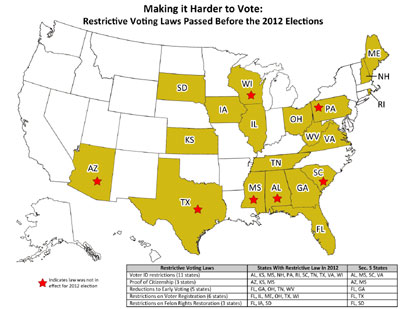The Supreme Court is releasing a series of decisions this week on a range of critical subjects including whether affirmative action still holds for universities (they punted it to a lower court), whether DOMA will stay in force (they rejected it as unconstitutional) and whether the Voting Rights Act’s most important statute remains.
On voting rights, which directly impacts the environmental and green business communities (and democracy in general), the Supreme Court made a regressive decision, arguably their worst ever along with Citizens United.
The U.S. Supreme Court struck down Section 4 of the Voting Rights Act, the formula used as the basis for Section 5 coverage, which since 1965 required all or parts of 15 states with a history of discriminatory voting practices to get federal preclearance before making any changes to their voting procedures.
In 2006, both houses of Congress voted to extend Section 5 for another 15 years after enormous research and endless hearings – 15,000 pages of testimony showed that discrimination continued in those states and that they should continue being "covered."
After last year’s elections when voter suppression in states reached new highs, one would think it would be a no-brainer for the Supreme Court not to overturn the decision made by Congress to keep it in force.
But they shot it down, purportedly returning it to Congress to update the formula that determines which states are covered. Times have changed since the 1960s they say.
2006, when the law passed unanimously in the Senate and close to that in the House, is another era when it comes to Congress. There’s no way the current, completely dysfunctional Congress can or would take up revising this law in any meaningful way.
"The decision threatens the promise of equal access to the ballot…We have essentially lost an effective tool today to stave off voter suppression this year, because states like Virginia and North Carolina will not have to submit their photo ID laws for preclearance," says Penda Hair, Co-Director of the Advancement Project.
On the same day the Supreme Court announced their ruling, several states jumped to pass legislation that restricts voting. In North Carolina, for example, where Republicans have a full majority, they excitedly moved to pass the "full bill" which would didn’t have a chance of approval by the Justice Department.
That bill requires specific voter IDs, cuts early voting in half and eliminates Sunday voting and same-day registration. Texas is passing a similar bill. These restrictions make it hard for people who tend to vote Democrat (students and minorities).
Obviously, in a democracy, access to voting should be expanded, not restricted. In their ideal world only white, older people would vote, who tend to vote Republican.
"Eleven out of the 15 states covered by Section 5 enacted, or are pursuing, restrictive voting laws this year. And despite the climbing demographic power of voters of color that is often cited to discredit the provision, those turnout numbers were made possible only after the defeat of voter suppression bills challenged under Section 5, notes the Advancement Project.
Representatives Mark Pocan (D-WI) and Keith Ellison (D-MN) will quickly introduce the Right to Vote Amendment to the Constitution, which would guarantee the right to vote for all citizens. Good luck getting it passed!

Here’s a full view of this map and even more restrictive map for 2013:

But this is not obvious. Democracy implies government aligned with the best interests, wisdom, and conscience of the people, not merely “everybody votes.” If some people do not give mature thought to their vote, or are completely ignorant of the issues and vote merely because of emotions, targeted tv ads, brainwashing, and pandering, lying demagogues, then they are not really contributing to democracy. You might disagree, but in any case your point is not “obvious.”
To clarify: my previous comment is in response to the article’s statement “Obviously, in a democracy, access to voting should be expanded, not restricted.”